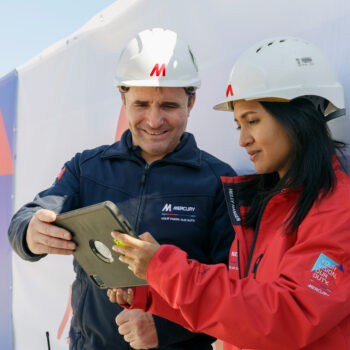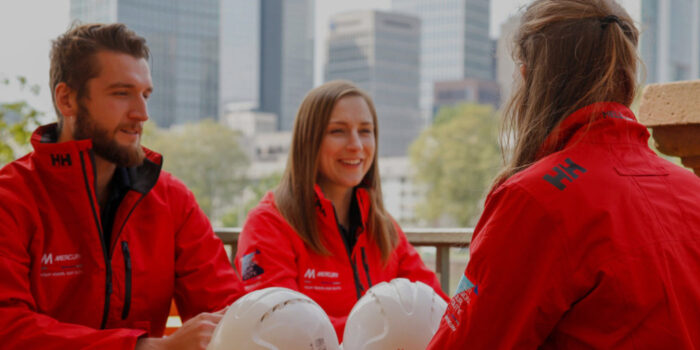News & Insights

Johnny McFadden: Maintaining responsible partnerships for greener procurement
Johnny McFadden, Mercury’s Group Head of Procurement recently spoke about how greener procurement can influence sustainability and what it means for Mercury to be a responsible partner to our clients, sub-contractors, and vendors.
You can read Johnny’s full interview below.
Why the strong focus on Sustainable Procurement at this time?
“The dynamics around supply-chain and implementing more sustainable procurement processes and procedures makes it important to note that external pressures and influences are shaping this profoundly. For example, societal and investor pressures on clients are now cascading down the supply-chain to the construction of facilities and Governmental and EU directives are increasingly impacting this space. Sustainability is now a competitive issue within our industry. It can determine the success rates of winning contracts in the construction industry depending on how much you focus on having responsible partnerships which is the second of our four sustainability duties at Mercury (Maintaining Responsible Partnerships).”
“While we remain responsive to client sustainability needs, we hold ourselves accountable for reaching climate and responsible business targets and as such we also have an increasing need for our supply-chain to be active with their own sustainability approaches.”
Specifically, what do you mean by maintaining responsible partnerships?
“Let’s take the example of our supply-chain, our clients increasingly require us to lower operational and embodied carbon related to our construction activities. In order to achieve this, we engage with our supply-chain regarding building materials. We need to obtain EPDs (Environmental Product Declarations) for all materials to understand their impact on the embodied carbon of the structure and how we can lower this by making changes. We do this in collaboration with our suppliers and we use this information in the EC3 carbon calculating tool to track our progress in lowering embodied carbon. Other examples include tracking our usage of energy and water and how effectively we deal with construction waste – diverting waste from landfill and look for recycling options. Suppliers can really contribute to the reduction of waste at construction sites by removing packing materials upon delivery”.
Why don’t all companies already have these practices in place?
“A large number of companies are already doing something – mainly segregation of waste but in general there seems to be a lack of understanding of how traditional practices negatively impact on sustainable outcomes. For example, in some cases you will find tax breaks for companies using fossil fuels and no incentive towards using renewable energy sources, this would be an example of the environment supporting the move towards more sustainable procurement from a supply-chain perspective. While there are no more suppliers offering rechargeable equipment for construction sites, there are still gaps in what is available to run on renewable energy sources”.
What are we doing about the challenge of greener supply-chains?
“We find ourselves in a position where both employees and supply-chain partners may not have sufficient training in this area, and we are often coaching and supporting these key stakeholders to influence better decision making in sustainable procurement outcomes”.
“We have a code of conduct for suppliers and sub-contractors which covers a few key areas such as human rights, labour, environment and data protection. We expect our supply-chain partners to sign a commitment to comply with our basic requirements in this regard. We also plan to implement annual reviews with our top tier supply-chain partners. The reviews would be a dialogue where we clarify the sustainability results, we are hoping to achieve and to understand any challenges they experience in helping us achieve those results”.
“It is worth mentioning at this point that we are implementing the EcoVadis platform for monitoring ratings of our top tier suppliers and subcontractors. This will give us the opportunity to understand where they may need more support and help from us on their sustainability journeys and will help us track the progress of our supply chain in general towards the outcomes, we, and our client’s desire”.
Any final words on Sustainable Procurement?
“As we all head towards the year 2030 and ultimately 2050, collaboration is going to be key both internally among departments and projects and externally with local communities, supply-chain partners and client’s organisations in order to reach the carbon emission reductions required to address climate change challenges. Updating building standards and legislation along with offering meaningful incentives will go a long way to helping us achieve sustainability goals sooner rather than later”.
OUR PLANET, OUR DUTY
We believe that we each have a role to play in contributing to the sustainable development of our planet. With this in mind, we have launched Our Planet, Our Duty, our Responsible Business plan. Our Planet, Our Duty is our promise to help create a more sustainable environment around us. It forms one of the foundation blocks of Beyond50, our five year plan to push further and take Mercury beyond our 50th year in business. Click on the link below to read more.
Like Mercury on Facebook.
Follow us on LinkedIn, Twitter, and Instagram.


